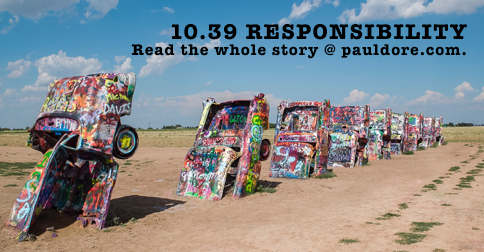10.39 Responsibility
An incident occurred a while ago that I would like to speak about here. However, there are certain things that I do believe are not constructive to write about directly, due to the sensitive subject matter, people involved, and proven fact that a balanced discussion is sometimes difficult. Instead, I am going to take a simple case study and use it to illustrate a few points that have consumed my brain for the last few weeks.
The thing that I’m interested to explore, if even briefly - certainly not exhaustively - is the concept of responsibility. Something important that I learned from my father was that in order to build anything that is worth building, to essentially be a leader, one must understand, appreciate, and respect the responsibility that is being undertaken. After all, we are all living in silos. We need each other. These things that are worth building require partnerships with other people. And with other people comes responsibility.
I’m going to use this case study as a thing that stands in for another thing. It’s just the way things are going with this post. So here’s the thing. I’ve been riding my bike to work most mornings, which requires me to cross the city. It’s a bit hairy out there during rush hour, as anyone who has undertaken this journey across the city can attest to. I was cutting along a relatively quiet street that runs parallel to the Distillery District. I usually keep an eye when passing parked cars, in case someone opens their door. I’m riding along and this exact thing happens - a gentleman in a parked car suddenly opened his driver’s side door. I swerved out of the way, and said, “Watch out when you open your door!” To this, he started yelling profanities at me.
So, simple story, right? Car door opens, I swerve, tell him to watch it, he yells. I was a bit shaken up for the rest of the ride - not due to almost being smoked by a door, although that would have sucked - but because of the yelling. Let’s remove the fault part of this, although I am really biting my lip on it. And it will totally become evident with the rest of this post.
The first thing that popped into my mind was the reactions. When I said - Watch out - I wasn’t the most polite person in the world, but I wasn’t angry either. Immediately, I recognized that he didn’t know I was there, and my instinct was two-fold: bring his awareness to me, and suggest he watch out. His reaction was to yell profanities at me. I found this to be a strange reaction. I understand that our immediate reaction is usually that the other party is at fault, but sometimes it might be a good idea to quickly assess the situation, get the facts, understand the course of events, and then place blame.
What is my responsibility in all this? Some people have suggested that I was in the wrong, that I should have stopped and explained to him that he needed to look to make sure that no bikes were coming before he opened his door. I call bull shit on this. If he has already made up his mind and taking no responsibility for his actions, what could I possibly say that would change his mind. Now, I’m not saying we shouldn’t try and change people’s minds if what they’re up to his negative or destructive to others.
I’ve been told and at various times believed that I shouldn’t expect so much out of people. Fuck that, if we’re adults, we have the ability to learn new things and perspectives. Stop being lazy and do the work. You’ve hurt someone else? Try to understand why. You’ve made a bad decision? See and accept the consequences of your actions, and make a different decision next time. I give people too many passes, and for some reason, I give too many passes to people who are not learning and who don’t deserve it. This is absolutely terrible to say, but maybe in this particular situation, this guy has to really injury someone in order to understand his responsibility?
Yes, I would like to stop and have a conversation with this person, and explain that without the simple action of looking to see if there are no bikes coming, he could have seriously injured someone. And I would like him to say, “Jeez, I never thought about that. I will always check to make sure the way is clear!” And … scene. Things don’t happen this way. In order to fully engage with your responsibility, it means admitting something about yourself that you might not want to acknowledge. It means opening yourself up to being vulnerable. It means potentially being wrong. Just be wrong, but do the work to figure out why. For fuck’s sake.
I just feel that in general, I’d like to see more people take responsibility for their actions. I really do believe we’d be better off if we listened more deeply, really did the work in understanding other people, and were open to potentially being in the wrong sometimes. Being wrong is a chance to figure something out.
Okay, I’m done.

